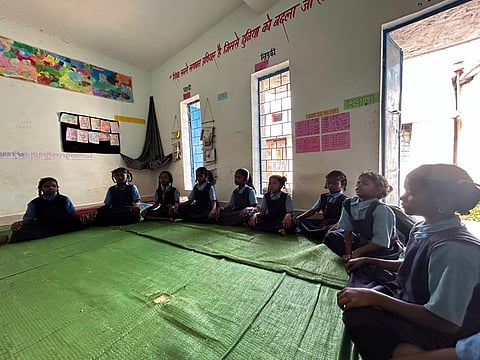

"What is the meaning of truth?"
I asked, seated in a circle with my classroom of eager students from Classes III to V in Burdi Village, deep within the forests of Sukma District, Dakshin Chhattisgarh.
The children, eyes wide with curiosity, answered as expected, “We should always speak the truth.”
But what I was truly interested in was what lay beneath that surface understanding. I wondered: When does truth become complicated, even for these young minds?
I acknowledged their response and reiterated my question, another student said, "The opposite of truth is false." I acknowledged this and asked for its deeper meaning. Expecting such responses, I approved them and moved on to the next question:
"Should we always speak the truth?" All of them unanimously agreed.
I narrated two distinct scenarios — a boy comes home, and his mother promises to cook something special. The boy asks for bhindi (okra), and while his mother is cooking, she accidentally adds too much salt. The boy tasted it and hesitated, and I asked the students if the boy should tell the truth or lie. If he tells the truth, his mother might get hurt; if he lies, he creates a false impression.
I then asked the students what they would do in such a situation. Interestingly, a gender divide in perspectives emerged. All the boys in the classroom favoured telling the truth, while girls leaned towards sparing the mother's feelings.
I altered the story but replaced the mother with a friend who aspires to be a cook. The friend invites the boy to try a new bhindi recipe but accidentally adds too much chilli powder. Now, the dilemma is whether to tell the friend the truth.
Surprisingly, the perspectives shifted, with both boys and girls suggesting that telling the truth would help the friend improve her cooking skills in the future.
It was fascinating to observe this shift in perspectives during the two scenarios, one negating and the other asserting the initial statement — to illustrate how our moral and ethical standards shift with time, space, and circumstances.
The entire activity aimed to facilitate a simple and humane conversation, encouraging them to contemplate various perspectives beyond literacy and numeracy and to foster critical thinking in their approaches.
As a philosophy graduate, I have always believed that children are born philosophers.
The kind of questions they ask, the intensity of curiosity they show during their development age, and as a society we have always suppressed such unique and critical questions because we want to give concrete answers to our children rather than engaging with them in a discussion where we accept that we do not know the right answers to these questions but the least effort we can put here is to facilitate such questions so that the curious mind of our children liberate them to ask questions to understand this complex world.
This initiative called Socratic Dialogue was one such initiative to see and understand how the children engage with such fundamental philosophical questions with their existing experiences and perceptions. The objective of the session was not to find answers but to start thinking about them by asking the right questions.
By engaging in these simple yet profound dialogues, I hope to create a space where curiosity is nurtured and children feel empowered to navigate the complexities of the world around them — one question at a time.
(Mohineesh Bhatjiwale is a Teach For India Fellow from the Cohort of 2021. He currently works as a Program Manager at Shiksharth, a Not-For-Profit Organisation serving students from Tribal Communities in Sukma, Chattisgarh. Views expressed are his own.)
